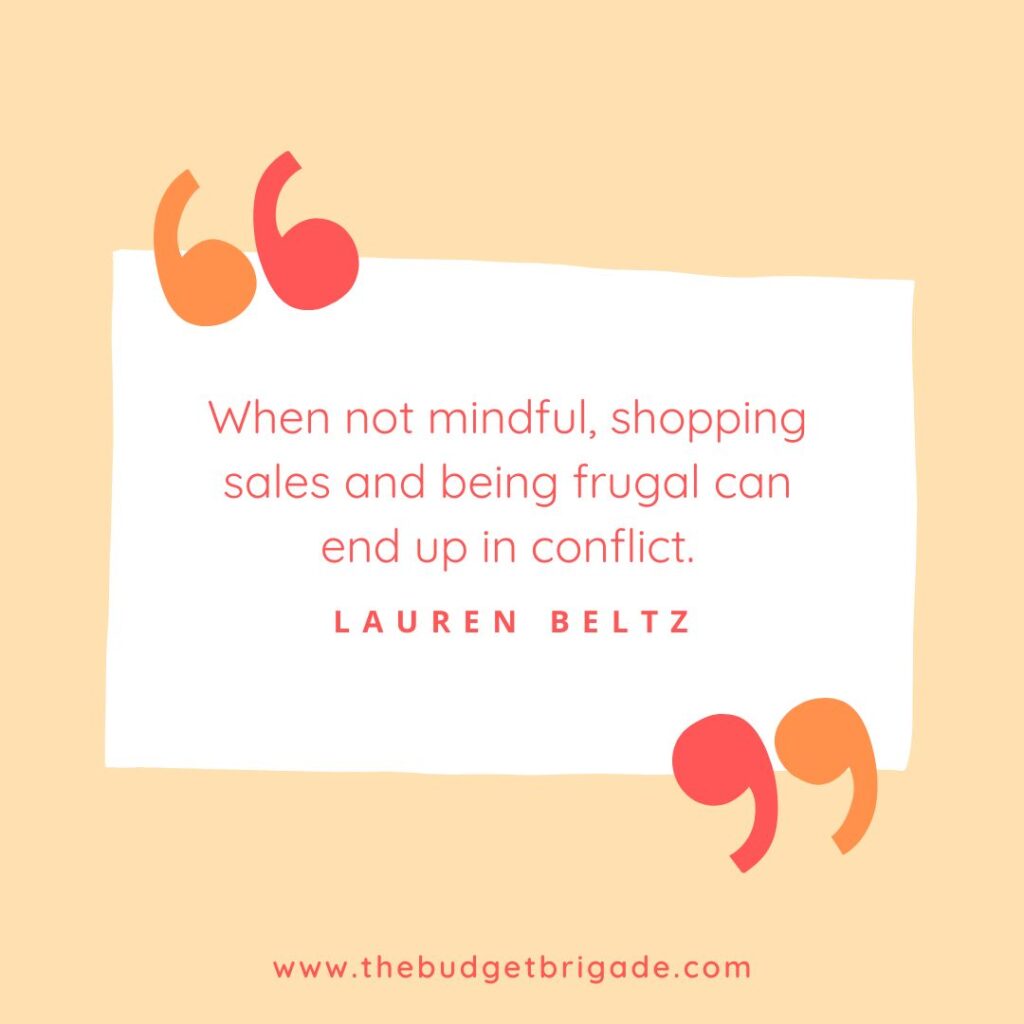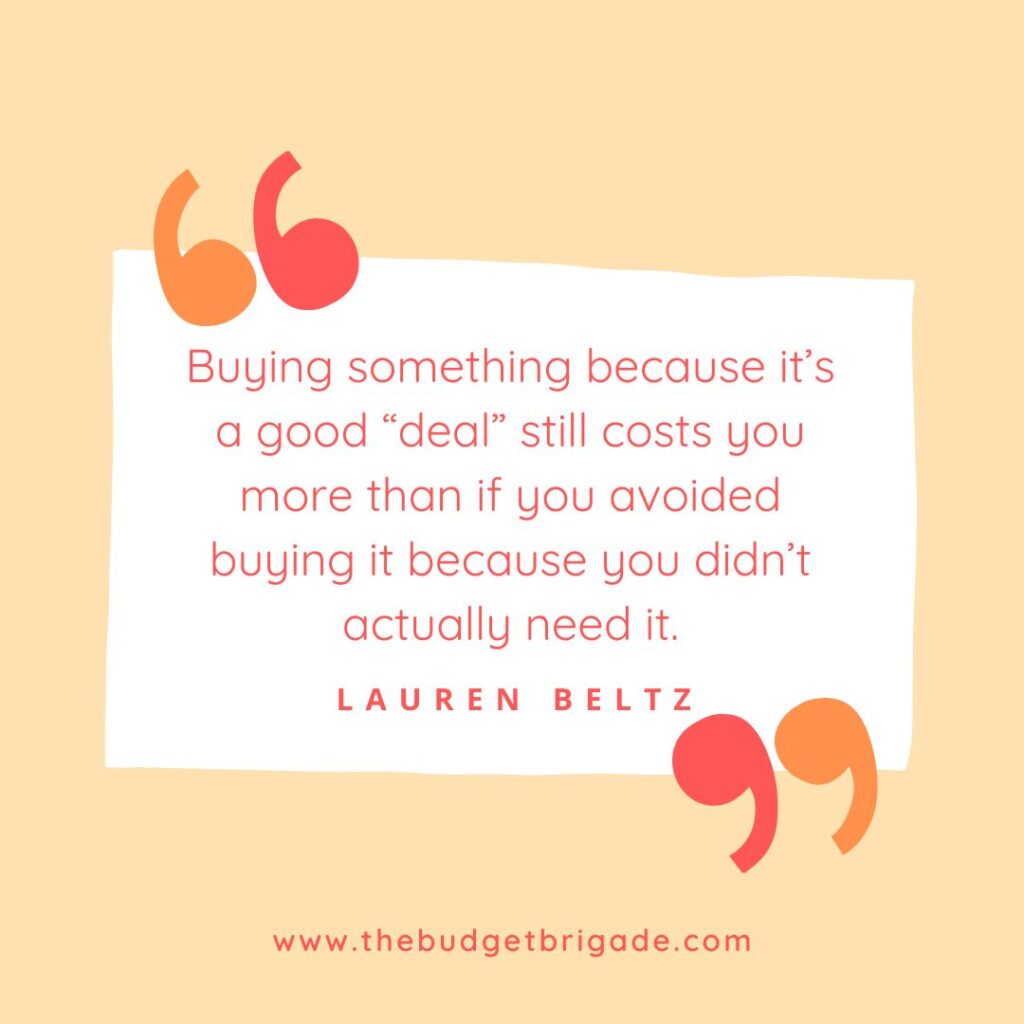Growing up, I learned quickly that when we went shopping for clothes, we bypassed the fancy headless mannequins sporting this season’s latest tops and dresses. Instead, we headed to the disarray of tangled hangers, straps, and price tags better known as the clearance rack.
We shopped generic instead of name brand products, and we rarely bought clothes that weren’t on sale. BOGO (buy one get one) was a popular shorthand we learned quickly, and coupons were king.
Growing up in a typical (lower) middle class American family that was acquainted with money struggles, I’m grateful I learned how to be frugal and to shop sales. But I’ve also learned over the years that, when not mindful, these two concepts can starkly contrast.

When you live and breathe deals, it’s easy to turn a sale into a prize. It’s even easier to justify a purchase because it’s discounted.
The 75″ 4K TV is $200 off at Costco? We were going to upgrade at some point, might as well make it today! The Tabasco shirt at Target is 5% off? Throw it in the cart. Pasta is buy one get on free this week? Grab eight to stock up, I’m sure we’ll have a hurricane eventually this year.
In my quest for a bargain, I’ve justified a lot of purchases over the years that I didn’t need and that weren’t good for me (ultra processed foods like BOGO pierogis and Yakisoba noodles, it turns out, haven’t done my gut any favors). Often, my BOGO purchases, like 32oz ketchup bottles, went bad before I could finish them. We’ve bought things in bulk that had no business cluttering up our shelves, like 24 boxes of Kleenex for a household of two. We were allergic to everything in Florida and even we didn’t need to blow our noses that often.
Read our PSA about bulk shopping at warehouse clubs.
And don’t get me started on how much money I’ve spent on books I picked up in the bargain section of Books-a-Million. Dozens of which, years later, I still have not read.
A sale is a good deal… until it isn’t.
The dirty little secret is that buying something you don’t need just because it’s a good “deal” ends up costing you more than if you didn’t buy it in the first place. I’ve learned the hard way that just because something is on sale doesn’t mean it’s a good purchase. It’s only a good deal if it’s something I needed or truly valued and wanted.

The Snickers ice cream bars I mainlined during finals week in college, purchased because I stacked a coupon with a BOGO deal? I would have saved a lot of money if I had skipped stress eating empty calories. I saved $1,900 on that TV on sale because the 55″ 1080 pixel TV we have in the living still works perfectly fine. (No one really needs to see the definition of Glen Powell’s pores while he’s chasing tornadoes.)
All those books I still haven’t read that I paid to ship halfway across the country? I could have borrowed them from the library for free.
Explore my favorite budgeting hack AKA the public library.
Companies know that the scarcity mindset is part of our little lizard brains. Buy now or miss your chance, preorder and save, get in line for Black Friday doorbusters: these are all marketing schemes to trigger FOMO and push us to impulse buy stuff we don’t need.
And it works, if we let it.
Take La-Z-Boy for instance. No matter when you drive past their store, there’s some kind of sale going on. Presidents’ Day Sale, Memorial Day Sale, Third Friday in June Extravaganza – the price tags never change, and yet the illusion of a “deal” is a marketing ploy that works because they update their signage every few weeks and most of us don’t pay attention, especially on impulse purchases. They want you to think you’re getting a limited time offer. Act now or miss your chance!
When we bought our La-Z-Boys, we ended up getting a deal–but only because we waited and bartered. And first, we walked away. We didn’t let their “the sale ends this weekend” pressure tactics work. We did more research and negotiated a better price than the “sale” discount before making a purchase weeks later.
The same cannot be true of my previous addiction to bargain books. Each time I went, I loaded up on the new books that rotated into the land of bargain stickers. The only solution I found to curb my enthusiasm was putting it in the budget (and sticking with said budget) and avoiding the bookstore when I wanted to “therapy shop.”
Sales can be a great way to save some money–if you stay intentional with your spending. But beware the tendency to buy for the sake of the sale. Your budget will thank you later.
